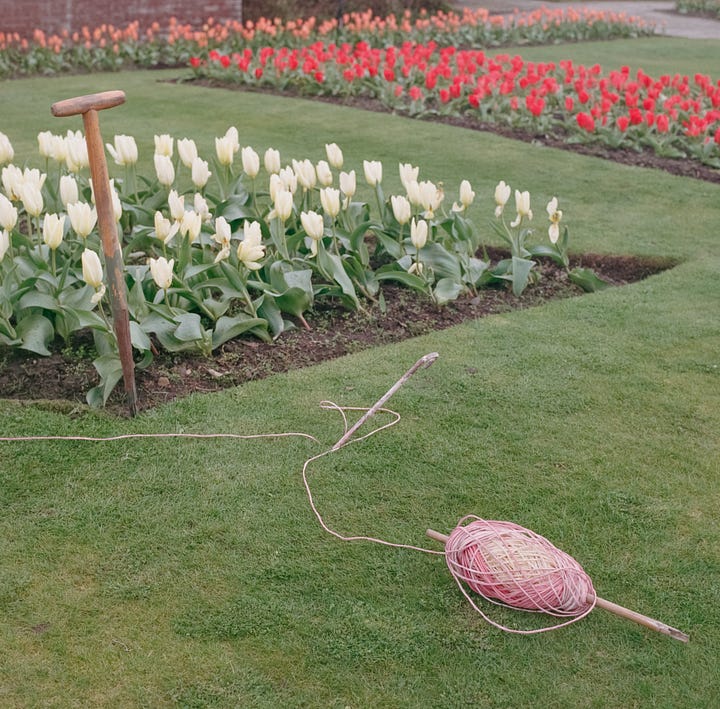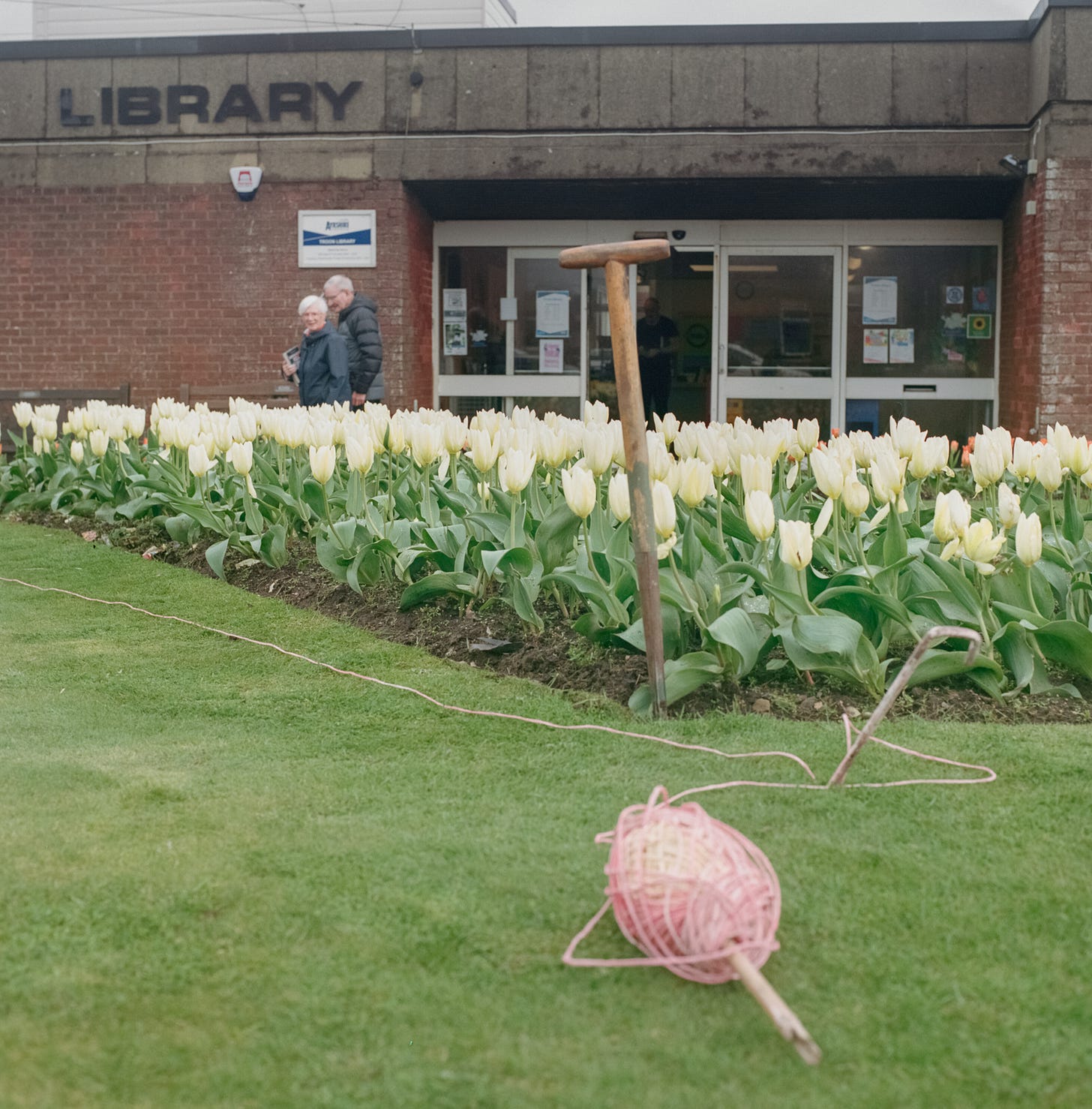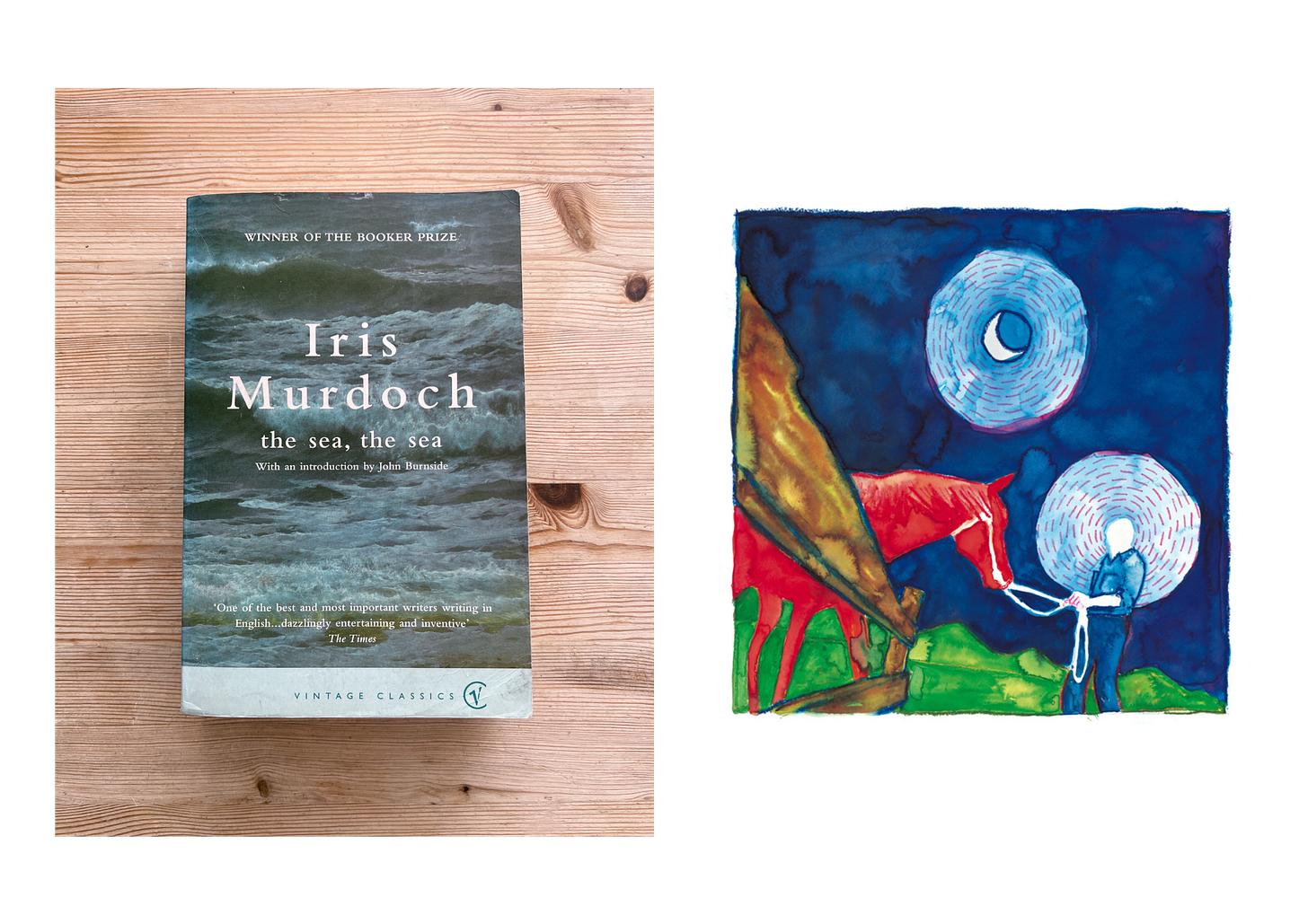There are libraries in Scotland which sit atop ponds, where children play on one side of bunting clad railings and on the other, ducks dunk their heads in the water, bums in the air — one of my favourite individual motions of any animal — kicking their little webbed feet to stay under a little longer, snacking on whatever’s down there. There are libraries with front gardens flooded with tulips. Outside one library, the app on my phone recorded the call of a kingfisher. I’ve visited a number of Scottish libraries lately as Environmentalist-in-Residence with West Dunbartonshire Libraries and as part of SLIC’s Shelf Life initiative, which aims to raise awareness of issues like recycling, sustainability and climate change. It became clearer than ever that each one of these buildings is unique, shaping itself, or shaping the place it serves, and that’s before I even stepped inside.
The Nature Library will soon open the doors of its new permanent home in Ayrshire. Not long after that, it’ll be heading to its northernmost location yet for a pop up in its most grandiose venue yet.
This is a short letter about libraries.
new location / KIRKWALL
Firstly, The Nature Library is heading to Kirkwall next month as part of the Orkney Nature Festival! Installed at St. Magnus Cathedral from May 13-19, the collection will be curated around the festival programme, and it is an incredible programme — snorkelling in seagrass meadows and birdwatching over peatlands and sea cliffs, arts and crafts and wildlife walks, hosted by the likes of RSPB, Project Seagrass, Orkney Native Wildlife Project and more. Much more. Full details here.
permanent location / IRVINE
While the books will still pop up across Scotland, The Nature Library’s new permanent home will open in Irvine, Ayrshire on Friday 3 May at 10am. Handmade bookmarks and other treats will be available to visitors all through opening weekend, and if you have any questions about visiting please get in touch thenaturelib@gmail.com. Read more here.
libraries, learning, and little treats
Libraries are sustainable by nature. This was an idea at the core of CILIPS’ recent Libraries for a Sustainable Future event, where library workers gathered to discussed the concept of sustainable libraries and how they contribute Scotland’s future. Not only do books hold stories which cause (or at least are a source of droplets which can in turn cause) ripple effects impossible to predict or measure but of undeniable value all the same, not only that, but also, every time a book is checked out and read, its carbon footprint decreases (in contrast, an e-book’s carbon footprint increases with each use). The library as symbol for a circular economy, then; reducing, reusing and recycling just by being, resisting the root causes of climate change without even trying. Inherently encouraging cooperation and trust. Valuing curiosity, learning and personal growth over consumerism and financial profits.
Mark Stephen from BBC Out of Doors recently visited The Nature Library’s new space in Irvine, opening in one of the Scottish Maritime Museum’s shipyard worker’s flats. He suggested that the library, in this particular place, encourages a return to learning for learning’s sake, saying that “When shipbuilding started here at the start of industrialisation, people very quickly became aware of the fact that people wanted to learn. So, they would set up libraries.” People would in turn become experts in all sorts of things purely and simply because of two necessary things: they wanted to, and they had access. “Bringing it back to the shipworker’s cottage, it closes the circle again.” You can listen to the full conversation here.
I hope this is true. I can think of few things I’d enjoy more than to see library visitors learning how to make seaweed fertiliser, or prune and graft apple trees, or cultivate corals for the bone and dental transplant industry, for no reason other than because they want to. As long as I’m alive on earth, born into and growing up day by day learning how to fit into it, following its rules, paying the bills, filling out endless forms, I want to enjoy being here. Is it the being or the here I want to emphasise? I want to understand what the plants are growing through the cracks beneath my feet. Or what’s making this spring more tumultuous than last. I want to listen to the language of birds and whales and I don’t care if I’ll never understand it, but I’m glad some people do, or at trying to, and anytime they try to explain it to me, I’ll be listening. No one person has more of a right to knowledge, truth, beauty than another. Everyone should have access to not only the wonders and complexities of the world, but also to an understanding of how life on it is changing. Whether it’s with fiction that takes a reader into the life of someone else to experience a place, an emotion or a situation from a different perspective (The Passion According to G.H. by Clarice Lispector is a sublime fever dream of an example of this), or non-fiction filled showing parts of the planet otherwise utterly inaccessible, or poetry to unravel, unpick and rearrange thoughts into new shapes, libraries offer it to us all, freely.
As if deserving meant anything. As if one could earn beauty, or life! He tried to think of nothing at all, to let himself be borne forward and to watch the sunlight in the gentle sky and the little sheep bouncing in the fields of spring.
Ursula K Le Guin, The Dispossessed
At Libraries for a Sustainable Future, Professor Gobinda Chowdhury suggested that libraries are the only organisation which caters to every single level of society. All ages, all demographics, from the moment you’re born until the day you die, the library has something for you. As an idea, as an image, I adore this. But I’m not sure I agree with it. I’m thinking about a supermarket. I’m seeing its flourescent lights, feeling the comforting embrace of the cosy aisles stacked high with jars, bottles, boxes, fruit fresh, tinned and frozen, tubs of ice cream to serve on top warm with crumble. Tea and biscuits, fresh bread and butter, jam and pickles, Robinsons and McVities and the best shape of pasta as well as diapers, washing up liquid, period products, bin bags, toothpaste, batteries, flowers for the table. I feel like I’ve stepped into a concentration of the world when I walk into a big supermarket. Just as it is, as Billy Connolly says, to be inside a library. “Books are your ticket to the whole world”, he says. “They’re a free ticket to the entire earth”. And there it is. Free.
(I’m getting distracted by this pairing of libraries — knowledge, learning, discovery — and food. I think it’s something about what is essential, and happen also to be delectably enjoyable pastimes. It’s about nourishment, I suppose. “Of course reading and thinking are important”, acknowledges Charles Arrowby, the narrator of Iris Murdoch’s The Sea, The Sea, “but, my God, food is important too. How fortunate we are to be food-consuming animals.”)
Back to libraries as a free ticket to the whole world, for all. Public libraries support every single person in a community by providing a world of information, exploration and pleasure. “All this is too obvious”, to quote Simone Weil. It’s almost unspeakably obvious. I’m almost embarrassed to say it at all. But right now, a lot of what nourishes the human body and mind is being devalued, so as long as libraries continue to see cuts and closures, it bears repeating. Last month I was standing outside of Dumbarton library five minutes before it opened and in those five minutes, a small group gathered. Seven women, one baby and a teenage boy, waiting for those doors to unlock. The value of keeping these buildings open, and I hope, of opening new ones, is more than anything gained by closing them.
And it’s more than just free books that libraries offer to communities. Of course it is! How obvious again. Books as objects are the mind made tangible; someone managed to put all of their swirling and evolving thoughts and desires and fears into some kind of order and we call it a ‘book’ but it’s everything inside the book, everything and everyone who made the book. Am I saying that books are people? Are they living? This, again, will be obvious to anyone who’s experienced the heartache of saying goodbye when they finish one.
A book is more than a physical object and a library is more than the books on its shelves. Of course, of course. A library is filled with people as a gallery is not filled with artwork but with artists, places, ideas. Obviously. A restaurant is not the food on the table but the chefs and kitchen porters, the bodies buzzing about front of house, diners humming and hawing over menus or going straight for their usual. It’s about what’s on the menu, why someone put it there, where it came from and how it was made, and who worked to get each element on it from soil, sea and sky.
Anthony Doerr dedicated Cloud Cuckoo Land to librarians “then, now and in the years to come”. When asked why, he responded, “Each of the five main characters in the novel forms a relationship with at least one librarian. I hope that my readers will be reminded that librarians serve as stewards of human memory—without librarians, we lose perhaps our most important windows into the human journey.” Libraries hold and nurture local history and culture, they hold what was and what could be. Librarians and Archivists with Palestine have been documenting the ongoing destruction of cultural sites in Palestine focusing on libraries, archives, and museums including the Central Archives of Gaza City and the Rafah Museum, as well as remembering the librarians and archivists who have been killed in the ongoing attacks on Gaza and the Palestinian people. The destruction of these buildings and the killing of the people who work tirelessly to preserve them and the knowledge they hold is the loss of more than I can fathom; entire worlds and potential of new ones.
There will be historians who understand how and when humans first crafted their thoughts onto stone and paper, deciding what sounds looked like, how to form a letter, a symbol, a word, and most importantly how to share them. But to me, it’s magic. There are a lot of things humans are doing in world today which put real question marks over the (self-attributed) title of most intelligent species, but language, stories, those things are clever. No wonder we started building libraries.
One of the secrets of a happy life is continuous small treats, and if some of these can be inexpensive and quickly procured so much the better.
The Sea, The Sea, Iris Murdoch


This week I went to photograph Troon library in all its spring splendour and ended up speaking to Richard, who’s been looking after its garden for fifteen years. In the short time I was there around one person for each of those years commented, while passing, on how beautiful the tulips are and thanked him for them. The bees were less vocal with their enthusiasm but sometimes it goes without saying.
song / book
I’ve been pairing books with songs as and when a match comes to me. The first in this instalment that nobody asked for is The Sea, The Sea by Iris Murdoch with History of Lovers by Iron & Wine (from In the Reins).
Some say she knowingly tastes like a recipe
Although so foolish and willing
I said Babe I can picture you bend as if wanting to
Bow as the curtain goes downCoddle some men, they'll remember you bitterly
Fuck ‘em, they'll come back for more
I asked my Louise would she leave and so cripple me
Then came a knock at the door
The Nature Library will open on May 3 at 122B Montgomery Street in Irvine, Ayrshire at 10am.
Currently reading: Coral Whisperers: Scientists on the Brink, Irus Braverman
Read: Israeli Damage to Archives, Libraries, and Museums in Gaza, Librarians with Palestine
Read: Why we must defend and support our libraries
Read: Scottish Maritime Museum creates permanent home for the Nature Library on Irvine Harborside
Support: Special edition of The Living Mountain by artist Susie Leiper
Support: Narture CIC, who hosted The Nature Library in spring 2023, bake real bread to ‘earn the dough’ to fund town regeneration projects through art initiatives, and have just launched a crowdfunding campaign to boost their baking capacity.
Read: Bird nest caused fire that shut down gas terminal (This has an air of orcas and yachts about it — I see a pair of starlings using their beaks to fervently rub two sticks together.
Contribute: If a pig is killed in another country but shipped to the UK to produce bacon, it can legally be labelled as ‘British bacon’. On the subject of libraries valuing trust and communication, and supermarkets as being similarly responsible for looking after their communities, there’s a consultation open right now on fairer food labelling. You don’t need to answer every question, you can even only answer one, but every person using their voice (on this and anything else) lets the Government know that attention is being paid to their actions (or inaction). Respond here.
Shell name their UK oilfields after seabirds
Auk
Bittern, Brent
Curlew, Cormorant North, Cormorant South
Dunlin, Dunlin Southwest
Egret, Eider,
Fulmar,
Gannet, Goldeneye, Guillemot,
Heron,
Kestrel, Kingfisher, Kittiwake,
Mallard, Merlin,
Osprey,
Pelican, Penguin,
Scoter, Shearwater, Skua,
Teal, Teal South, Tern
Thank you,
Christina





